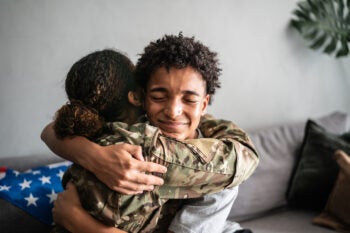Home / Health & Wellness Articles / Military Archives /
Veteran Caregivers: The Hidden Heroes of Our Nation

Veteran caregivers play a crucial role in supporting those who have served our country. Yet, when it comes to necessary resources, they often find themselves overlooked and under-supported. A study by the U.S. Department of Veterans Affairs reported there are almost 5.5 million people caring for veterans in the United States. While being a veteran caregiver can be a full-time job, and caregivers often face emotional, physical, and financial challenges while providing care, the support systems available to help them are limited and insufficient.
You may be asking yourself, what is a veteran caregiver, and what exactly do they do? Caregivers are often referred to as ‘hidden heroes’ who help those they care for live a better quality of life and enhance their recovery and rehabilitation. The responsibilities of a veteran caregiver can seem unending, and may include personal care, administering medication, preparing meals, providing transportation to appointments, and managing schedules. Essentially, it is the caregiver’s job to meet any physical, mental, or emotional health issues or concerns of the veteran. It’s important to keep in mind that caregivers can be a spouse, neighbor, relative, friend, or even a child and many have full-time jobs and families to care for outside of their caregiving responsibilities which is why additional supports and respite should be addressed.
While there are caregiver respite programs available, there is a significant shortage of accessible and effective programs that meet caregiver’s needs. It is important to acknowledge that we need more awareness around the deficit in respite opportunities that provide caregivers chances to rest, travel, or spending time with other family members. In addition to lack of awareness about resources, other significant barriers are financially-based. If the caregiver isn’t a spouse or child of the veteran in their care, they may not be eligible for certain caregiver benefits since those may be reserved only for direct family members.
Arguably the largest barrier to accessing care is a lack of funding. Not only are we seeing a general lack of financial support for programs like caregiver respite, but there is also a lack of financial assistance for caregivers overall. If the veteran being cared for has a disability or is medically retired, they can receive an income for one or both of these things. However, this income intended to help the veteran may actually disqualify them from available financial assistance because many of these programs require the recipient to be below the federal poverty level. This results in many veterans and their caregivers being disqualified from receiving additional assistance. Limited financial resources also force programs to be more judicious in what they offer and to whom. A 2024 study by Rand reported that military/veteran caregivers typically incur more than $8,000 annually in out-of-pocket costs. When you consider the fact that caregivers have families and lives of their own to manage, the additional out-of-pocket costs that come with caregiving can place significant financial strain on a family.
Simply stated, we need more. We need more resources, more access to these resources, and more support for the people responsible for the well-being of our nation’s heroes. Not only do veteran caregivers deserve an increase of financial support opportunities, but they should also be offered additional and fair compensation for the work they do. Caregiver support systems should also be better tailored for the diverse range of caregivers and their needs. We also need to promote work environments that are supportive of caregivers as well as empower them with education to increase public awareness of their contributions. Free counseling services for veteran caregivers, like those offered through Centerstone are a great way to help caregivers manage the mental load that comes with doing the work that they do.
Danette Fessler, Team Lead, and Diane Stover, Case Manager, serve patients and their families at Centerstone, a nonprofit health system specializing in mental health and substance use disorder services. Learn more at Centerstone.org.


